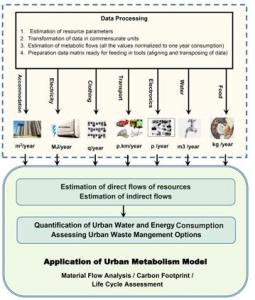
Urban populations (and the associated resource consumption) are one of the largest contributors to the global energy consumption and environmental impact. In India, there is continuous increase in urbanisation and almost 1/3 rd of the population is already staying in urbanised areas. With the challenges of global warming and other diverse environmental pressures on earth, it has become essential to decouple the growth from resource consumption such that there will be less pressure on the environment due to human activities. Circular economy is one of the approaches that will help in achieving sustainability.
Shifting from linear economy to circular economy has become imperative to be able to achieve sustainable growth in the cities. Achieving eco-efficiency along implementation of circular economy in urban areas should be the goal while designing strategies for sustainability.
We apply urban metabolism (UM) approach to quantify resource flows and associated waste and energy flows in urban areas. Such an information about flows is essential for deeper understanding of the nexus between resources, water, nutrients and energy.
Subsequently, coupling of UM with life cycle assessment (UM-LCA) provides an estimation of the associated environmental impact of these flows. The distinct outcomes from this study will be estimation of category wise resource consumption from urban residents, detailed study on water and energy consumption, and household and city-scale analysis of water related energy consumption. The data obtained from this study and estimated parameters of resource consumption will provide an opportunity to explore nexus between urban water, food and energy.
Prof. Pradip P Kalbar
